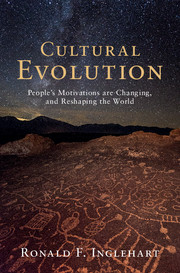Book contents
- Cultural Evolution
- Cultural Evolution
- Copyright page
- Dedication
- Contents
- Figures
- Tables
- Acknowledgments
- Introduction: An Overview of This Book
- 1 Evolutionary Modernization and Cultural Change
- 2 The Rise of Postmaterialist Values in the West and the World
- 3 Global Cultural Patterns
- 4 The End of Secularization?*
- 5 Cultural Change, Slow and Fast: The Distinctive Trajectory of Norms Governing Gender Equality and Sexual Orientation*
- 6 The Feminization of Society and Declining Willingness to Fight for One’s Country: The Individual-Level Component of the Long Peace*
- 7 Development and Democracy*
- 8 The Changing Roots of Happiness*
- 9 The Silent Revolution in Reverse: The Rise of Trump and the Authoritarian Populist Parties*
- 10 The Coming of Artificial Intelligence Society
- Appendices
- Notes
- References
- Index
6 - The Feminization of Society and Declining Willingness to Fight for One’s Country: The Individual-Level Component of the Long Peace*
Published online by Cambridge University Press: 16 March 2018
- Cultural Evolution
- Cultural Evolution
- Copyright page
- Dedication
- Contents
- Figures
- Tables
- Acknowledgments
- Introduction: An Overview of This Book
- 1 Evolutionary Modernization and Cultural Change
- 2 The Rise of Postmaterialist Values in the West and the World
- 3 Global Cultural Patterns
- 4 The End of Secularization?*
- 5 Cultural Change, Slow and Fast: The Distinctive Trajectory of Norms Governing Gender Equality and Sexual Orientation*
- 6 The Feminization of Society and Declining Willingness to Fight for One’s Country: The Individual-Level Component of the Long Peace*
- 7 Development and Democracy*
- 8 The Changing Roots of Happiness*
- 9 The Silent Revolution in Reverse: The Rise of Trump and the Authoritarian Populist Parties*
- 10 The Coming of Artificial Intelligence Society
- Appendices
- Notes
- References
- Index
Summary
- Type
- Chapter
- Information
- Cultural EvolutionPeople's Motivations are Changing, and Reshaping the World, pp. 102 - 113Publisher: Cambridge University PressPrint publication year: 2018



